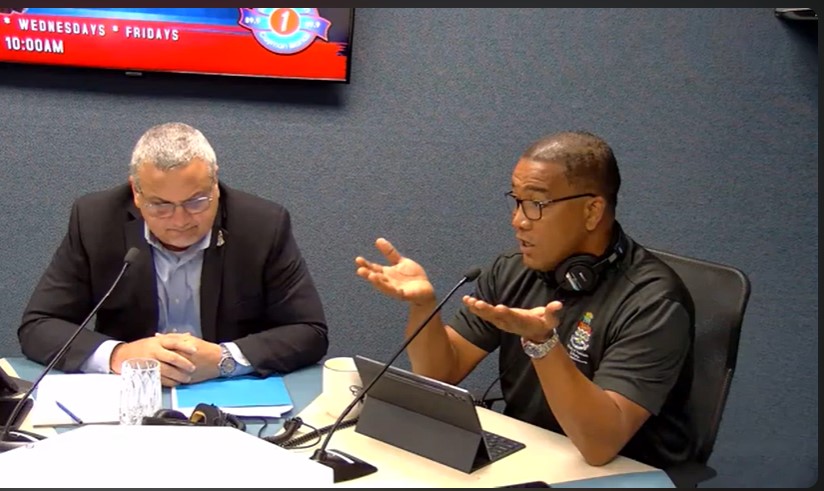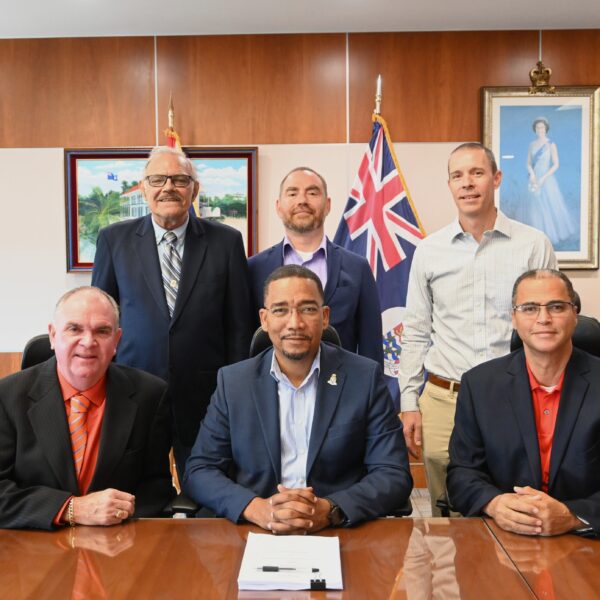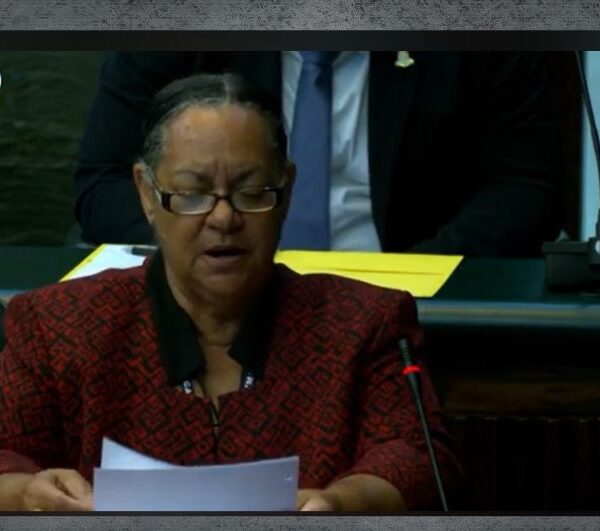
L-R: Deputy Governor Franz Manderson and MP Kenneth Bryan (image source: Radio Cayman, YouTube)
|
Getting your Trinity Audio player ready...
|
By Alric Lindsay
Deputy Governor Franz Manderson and Minister of Tourism Kenneth Bryan appeared on the For The Record talk show with Orrett Connor on September 20, 2024. They discussed ministers’ authority to hire and fire employees, the difficulties Caymanians encounter in securing jobs in the civil service, and the increasing proportion of foreign workers in the civil service, including the Royal Cayman Islands Police Service.
Power to hire and fire
Regarding the power to hire and fire, Mr Connor, the talk show host, highlighted section 109 of the Cayman constitution. This states:
109. (1) Power to make appointments to public offices, and to transfer, remove or exercise disciplinary control over persons holding or acting in such offices, is, subject to this Constitution, vested in the Governor acting in his or her discretion.
(2) Subject to subsections (3) and (4), the Governor, acting in his or her discretion, may by regulations delegate, to such extent and subject to such conditions as may be specified in the regulations, the powers vested in him or her by subsection (1) to such public officers as may be specified.
(3) Subject to subsection (4), a law enacted by the Legislature may provide for the powers vested in the Governor by subsection (1) to be exercised by public officers subordinate to the Governor, and may enable the Governor to delegate those powers to such public officers in his or her discretion.
(4) No regulations made under subsection (2) shall delegate any powers vested in the Governor in relation to the offices of Financial Secretary, Commissioner of Police, Auditor General, Information Commissioner, Complaints Commissioner or to any office to which section 106 applies, and no law enacted by the Legislature may provide for any person or authority other than the Governor to exercise those powers.
MP Kenneth Bryan acknowledged Mr Connor’s point and emphasized that the authority to hire civil servants has been given to the Deputy Governor. He also noted the special powers of the Governor as outlined in section 55 of the Cayman constitution. He did all of this to highlight that despite public perception, members of parliament do not have the authority to hire or dismiss civil servants.
Why misconceptions arise about MP powers and job challenges for Caymanians
Although MP Bryan explained that MPs do not have hiring and firing powers in the civil service, he indicated that there were still misconceptions in the community about what MPs can and cannot do.
He explained:
What we do get on a very regular basis is the want and the need for elected arm to help persons get jobs in the civil service. I mean, almost every day I get a call or a request from somebody say[ing], Ken, can you give me a job with the NRA or within your ministry or what have you? And many times I have to explain why I can’t help them get a job. And that’s the worst thing any representative want to say to a Caymanian. I can’t get you the most important thing in life, which is an opportunity to survive and live and feed your family.
He added that the impression held by Caymanians that MPs could help them get jobs likely stemmed from what he understood as practices from ministers decades ago.
Regarding this, he said:
… the perception of what used to be back in the day when, and I don’t like to use, I don’t want to use names, but I’m not suggesting they did it…. But I can recall as a child back in the day when Jim Bodden, Truman Bodden was in, there was this perception that, you know, just call your elected member and they’ll get you a job in the department.
And I know that back then they would call their permanent secretary, and next thing you hear that one of the persons that you called had a job.
Now, there is a lot of that expectation still today, and unfortunately, the appetite today, totally different than what it was back then. And Cayman has grown a whole lot.
MP Bryan explained that while he wished he had the power to hire Caymanians in the civil service the way it was done in the past, there is a “risk associated with the elected arm getting involved in the hiring.” This risk, of course, is that an MP would directly or indirectly breach the Cayman constitution by going outside his or her powers.
Without the Cayman constitution being amended in this respect, it is clear that MPs cannot actually do anything about hiring and firing in the civil service. Instead, the Governor has delegated this function to the Deputy Governor, who is the head of the civil service.
What would happen if the rules changed and MPs were given hiring and firing powers?
Notwithstanding MP Bryan’s concerns over the current limitations of MP powers, the Deputy Governor highlighted some dangers of changing the rules.
The Deputy Governor said:
So, some of the key issues I think you should be aware of is that the civil service is charged… under our code of conduct, we are to be politically neutral. In other words, we should behave in a way that when there is a change in government, the new people coming in feel very comfortable working with us. And to be very clear that we are going to work with them to deliver on their promises.
So, if you take for example, what Minister Bryan said, and said, listen, if I had the authority, I will employ, you know, my constituents. And that is a real issue. But I was saying to Minister Bryan in the break, Minister Bryant came in as a new minister. He took over the Ministry of tourism.
In that ministry, there were staff who had been working with the previous government for eight years. Minister Bryan came in and he never said to us, DG, I would like you to move all these people out and put all of my people in. He said, I am going to work with the team that is there.
Now, the reason why I could say to Minister Brian, you can go into your ministry, and I can assure you the team there will work as hard for you as they did for the previous minister, is because everyone in that ministry was hired through a process, a recruitment process that was done by a member of the civil service. No one in that ministry was appointed by a minister.
He continued:
So if, for example, ministers had appointed everyone in that ministry, Minister Bryan would come in and say, DG, you know, every one of these people were appointed by the former minister, I would like to get my people in now and so they can serve me. What do I do with the 15 people that the previous minister had in there?
So, you can see some of the nuances that is out there in terms of having continuity of government and continuity of services.
He added:
And just to say, I mean, what we’re talking about here is not new. This is something that has been around for a long time. It’s how the UK civil service works. Other modern civil service works. I think the US is a little different. You see a lot more changes when there is change in government. But having a politically neutral civil service, where we can say that everyone that is employed in the civil service went through a process, they were the best persons for the job, that the public is demanding great services from us.
Consequences of rules continuing unchanged
Reacting to the Deputy Governor’s comments, MP Bryan said that the Deputy Governor made a fair statement.
However, MP Bryan noted that if MPs could change out civil servants after each general election, “there’d be a little bit more loyalty to get the government’s policy done.”
He indicated that while MP restrictions remain unchanged, misperceptions among members of the public would continue as to where accountability lies for hiring and firing. That is, members of the public may not fully appreciate that powers are delegated to the Deputy Governor. Additionally, members of the public may find it challenging to understand who they can meaningfully hold accountable in this matrix.
MP Bryan added that another consequence of the restriction of MPs’ hiring powers is that the civil service is only 68% Caymanian, a percentage that may dwindle in the future if attention isn’t paid to hiring Caymanians.
Giving an example of his concerns and directing his comments to the Deputy Governor, MP Bryan continued:
So when a Caymanian, a young Caymanian , goes off to university, gets skilled up and come back home and say, you know, at least I will always be welcome in my own home, and then they can’t get a job in the service, then they look to their elected arm.
So, the fact is, it’s actually under your purview. Your office’s purview to these 1,300 jobs are not filled by Caymanians, but they expect the elected arm to do so, and rightfully so.
MP Bryan indicated that unless things change, every future MP will be faced with the same issues: the civil service is only 68% Caymanian, and returning Caymanian graduates have challenges getting jobs in the civil service.
Solutions
As a solution to these issues, MP Bryan noted that a rollover policy regarding foreigners in the civil service is currently being discussed. This would, presumably, address the number of years that a foreign worker would be employed in a post in the civil service.
Without such a solution, MP Bryan indicated that there would not only be employment issues for young Caymanians, but also national security issues.
Explaining this, MP Bryan said:
I’ll give you an example. We put the policy in place from previous, even the last government about the makeup of the police service, saying that it was a security concern and risk to have such a large population of one nationality in the police service. Seven years I’ve been elected seven years. Every year I look at the police yearly review book and the percentages have not decreased. We still have almost 40%, I think it’s 36% now of Jamaican nationals. And again, this is not about Jamaicans. It could have been Cubans.
I’m saying that you can’t have that large amount of anyone nationality in this police service because of the influence they have on our security state.
The Deputy Governor countered MP Bryan’s arguments by saying that non-Caymanians are in the civil service because they were hired only after the completion of a vigorous recruitment exercise “where there was no Caymanian who was available and qualified and had the ability to do that job.” There is, therefore, a rationale for the employment of non-Caymanians in the civil service.
As to the next steps, members of the public now wait to see what conclusions the Deputy Governor will reach regarding the proposed rollover policy for foreigners in the civil service and what, if any, legislation MPs may propose in upcoming sessions of the Parliament to change immigration rules or if they will request that constitutional changes be made to establish MPs’ hiring and firing powers.







